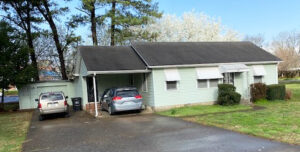By Norman Ridenhour
Baptist Layman & Retired Journalist

Mission homes, like this one owned by Third Baptist Church, Murfreesboro, provide comfort for missionaries while they are stateside.
Perhaps every Baptist knows about missionaries and the International Mission Board. These are men and women called to serve somewhere in the world to share the love of Jesus and to invest in lives through their sacrifice of leaving home to serve. Their tasks are many, with some setting up schools and teaching English, but most of all, investing in others by sharing the gospel with their new neighbors.
They travel worldwide to deliver that message and fulfill the commandment given by Christ to His followers. “Go tell the good news to the ends of the earth.”
Our missionaries spend two to three years on the mission field, some more, according to their mission tasks. Then they return for six months to a year on stateside leave, to refresh, recharge and catch up with family.
Many churches across Tennessee and other states have provided “mission homes” for those who serve. But those homes are disappearing. Most missionaries must start seeking a place to live when on leave two and three years in advance. That is because there are so few homes available today.
Why is this a problem? For many years churches had parsonages, where the pastor lived next to the church. Those became mission homes, but with time were sold or torn down when expansion was necessary. Most churches just do not consider the need or are fearful of the expense and liability.
The Women’s Missionary Union (WMU) has a long history of serving both national and international missionaries. They have a data base of all “mission homes” available across the nation. You might be surprised to learn there are only 39 such homes available in Tennessee.
One of those is in Rutherford County. Third Baptist Church in Murfreesboro maintains that home. Steve Hutson, the church’s missions pastor, said: “I get so many requests, that it is overwhelming. Sometimes two to three requests a week depending on the season.”
Because of expansion in past years and to create parking spaces, the church acquired three homes. One had to be torn down because of its location, but the other two are still owned by the church.
One of those was converted to a mission home, and there is a desire to eventually renovate the other to a second home for missionaries on leave
If this mission-minded church can offer a second home, that would mean 40 homes available statewide, two in Murfreesboro.
So what happens to others who return on leave? Church families take them in for a month, then another for a month. They and their children stay with four to six church families. The current resident missionary Leon Graffan said, “This is a dream for me and my family to live in a home with privacy, furnished, and a yard for kids to play. We pay no rent, just utilities. Few of us return to such a luxury.”
His family is involved with Third Baptist Church, and he speaks at churches throughout Middle Tennessee.
Another previous resident was from Rome, Ga. Murfreesboro was as close to home that he could get, and considered himself blessed to be that close.
So how does a church get involved in this important mission? There are many ways, but one is a “Legacy Estate Planning” program. This is when a person passes away and leaves their home to the church for the specific purpose of housing missionaries.
There are expenses for the church: maintenance, insurance, and utilities when the home is vacant, but those are offset so much because of what it does for our missionary families.
Most missionaries will tell you they can put everything they own in a couple of closets, but the need to find those closets is overwhelming. What a great way to support IMB missionaries and benefit your local church.
It has been stated before: “If you are unable to get involved in a ministry, support those who do.” We need mission homes. B&R — Ridenhour is a retired journalist and Baptist layman at Third Baptist Church, Murfreesboro.

